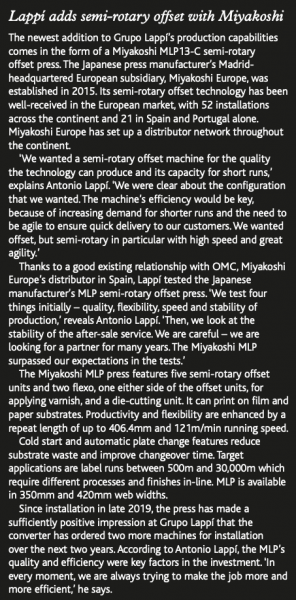Lappí eyes further expansion

Founded by current president and CEO Antonio Lappí’s father in 1959, the company moved away from its initial focus on commercial printing and into wet-glue label production in the mid-1970s. In 1990, it added self-adhesive labels to its repertoire. Today, the latter make up 40 percent of production, with wet-glue labels at around 48 percent, and the remainder taken by shrink sleeves and wraparound labels. The vast majority of production – 85-90 percent – is for the food and beverage markets, with small amounts sold for cosmetics, pharmaceutical and household cleaning products.
Antonio Lappí, after a stint at Leeds, UK-based label converter Jarvis Porter, joined his father’s business in 1998. Since then, the company has ramped up its investment in new technology and significantly expanded its local and international footprint.
Expansion
Grupo Lappí began its expansion from its headquarters in Seville with the acquisition of Barcelona-based label converter Gràfiques Martorell in 2004, then adding Gràfiques Llopart, also in the Catalan capital, in 2013.
International expansion began in 2019 when Grupo Lappí bought Gráficas Calipolense, the largest printer of labels for the food sector in Portugal. The deal brought with it two plants in the country, one dedicated to self-adhesive label production and one specialized in wet-glue labels.
Fifty-three percent of Lappí’s business is generated in Spain and Portugal, with 47 percent from exports. Of the latter figure, 80 percent comes from Europe – particularly Belgium, France, Germany, Holland and the UK; the remainder is export business in South America and Africa.
“If you look at the big label converting groups, there is a concentration in the northern Europe. Southern Europe needs a similar concentration”
With the acquisition of Gráficas Calipolense came a client base in Portugal’s former African colonies such as Angola, Cape Verde, Mozambique and São Tomé and Príncipe. Lappí also sells labels to Benin, Equatorial Guinea and Morocco. ‘Various markets in Africa – Equatorial Guinea, for example – are strong for wet-glue and wraparound labels. Wet-glue for beer labels; wraparound for water labels,’ says Antonio Lappí. ‘The pressure-sensitive label market is beginning to grow, albeit from a very low base. But the advantage of wet-glue labels remains – they are much more cost-effective.’
Firmly established as a leading converter on the Iberian Peninsula, Grupo Lappí is far from finished when it comes to further acquisitions, with at least one more likely to be concluded this year. NDA agreements are currently in place with companies in Spain and Portugal, and also in France – a country Antonio Lappí says ‘interests us very much’.
‘If you look at the big label converting groups in Europe, there is a concentration in the north of the continent. Companies in Germany have spread east; others have formed in the north. But there has not be quite so much consolidation in the south. There is potential for a group that covers Spain, Portugal, France and Italy, for example. Southern Europe needs to have a concentration in a similar way to northern Europe.
Can Grupo Lappí become a leading southern European converter group? ‘We want to grow exponentially, both organically and through acquisitions,’ says Lappí. The company’s ambition is not limited to its home continent, however. ‘We are also looking at the USA as a potential place to open a manufacturing facility. But it could also be a different, more innovative model – putting printing equipment into the factory of a client there, for example. The pandemic has shown us the importance of having local suppliers.’
What does the company look for when deciding to acquire another business? ‘A good balance sheet, of course. But the people are so important. We would never acquire a company that doesn’t already have a talented team in place.’
“Personal relationships used to be about lunch; now they are about solving the client’s problem in real time”

This focus on people, on personal relationships and local service, is important, but Antonio Lappí is clear that it is only one part of the story. ‘We are in a sector of services, and we are a company of costs. Many converters think they can forget about this, but they can’t. Clients are not hostages to their label suppliers. They are not loyal. It is about costs and efficiency. We send labels all over Europe, for example. This is not about personal relationships, but efficiency, quality and price. Personal relationships used to be about lunch; now they are about solving the client’s problem in real time.
‘Usually, the owners of the companies I visit do not want to sell their businesses, or aren’t actively looking to. But then they see what we are doing and see the threat down the line to the future of their business.’
Improvement
The threat comes in the form of Grupo Lappí’s relentless focus on continuous improvement. ‘Lean manufacturing, efficient management and production – it is super important. We develop it every day. Companies who are professionalised and efficient can flourish.’ Grupo Lappí prides itself on adaption and innovation. ‘We are constantly changing our ways of working,’ says Antonio Lappí. ‘Any roadblock that appears, we try to see the positive side – where is the opportunity?’ This attitude extends to the pandemic, and one gets the impression that Lappí has relished the challenge of adapting to such difficult circumstances. ‘The 2008 crisis taught us to be professional and gave us experience for this type of situation,’ he explains. ‘We have become even more efficient as a result of the pandemic. More agile and more flexible. We have invested a huge amount in the automation of our processes and in improving lean manufacturing. The pandemic has propelled us towards Industry 4.0 far quicker than would have happened without it.’
 The company developed a mobile app for internal use during the pandemic. Available in Spanish and Portuguese, it is used by all the company’s 250 employees, advising on changes and keeping staff informed of developments. ‘We have adapted really well to the situation,’ says Lappí. ‘Communication is key to improving processes.’ This online savvy extends to social media, which has also become a key tool for the company. During the pandemic, it hosted an open house which it live-streamed from the factory. It has created a Twitter feed – #LabelHub – where it shares live modifications with clients and designers.
The company developed a mobile app for internal use during the pandemic. Available in Spanish and Portuguese, it is used by all the company’s 250 employees, advising on changes and keeping staff informed of developments. ‘We have adapted really well to the situation,’ says Lappí. ‘Communication is key to improving processes.’ This online savvy extends to social media, which has also become a key tool for the company. During the pandemic, it hosted an open house which it live-streamed from the factory. It has created a Twitter feed – #LabelHub – where it shares live modifications with clients and designers.
Grupo Lappí reviews its printing technology suppliers every seven years, so decisions to invest in new machinery are not taken lightly. The converter runs 23 production lines across its plants, forming close relationships with the suppliers of equipment for each printing process. It can count on a wide range of printing technologies – including flexo and UV flexo, offset (both rotary and semi-rotary), digital, and silkscreen – and a host of finishing options.
For wet-glue label production, it relies on a fleet of nine 6-color Heidelberg Speedmaster presses. For digital printing, it runs two HP Indigo presses, one 6900 and one 6800. Four Nilpeter machines cover Lappí’s flexo printing requirements – two more have already been pencilled in for installation over the next 2-3 years. The latest addition was a Nilpeter FA-17 in late 2019, installed by the Danish press manufacturer’s longstanding Spanish distributor Esagraf.
In Gráficas Calipolense’s self-adhesive label factory, it runs an Omet rotary offset press combined with flexo units. Finishing mainly takes place on Digicon converting lines from A B Graphic.
The most recent addition to its printing arsenal is a Miyakoshi semi-rotary offset press (see boxout). Regarding future investment, according to Antonio Lappí the company is currently evaluating ‘different digital printing technologies to see if they might be able to complement the offering from the HP Indigo presses’.
Stay up to date
Subscribe to the free Label News newsletter and receive the latest content every week. We'll never share your email address.


